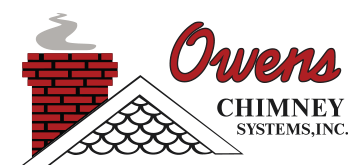 All fireplaces have a unique smell; however, a normal working fireplace will send the smell up and out of the chimney with the draft before it ever has the chance to seep into your home. Fireplace odor problems come from a variety of different things, the most notable of which are creosote deposits inside your chimney. The odors are usually worse in the summer (especially on days when the humidity is high), on rainy days, and/or when your air conditioner is running. A visit from a CSIA-certified chimney sweep can help eradicate those problem-causing creosote deposits, allowing you to breathe a little easier.
All fireplaces have a unique smell; however, a normal working fireplace will send the smell up and out of the chimney with the draft before it ever has the chance to seep into your home. Fireplace odor problems come from a variety of different things, the most notable of which are creosote deposits inside your chimney. The odors are usually worse in the summer (especially on days when the humidity is high), on rainy days, and/or when your air conditioner is running. A visit from a CSIA-certified chimney sweep can help eradicate those problem-causing creosote deposits, allowing you to breathe a little easier.
Creosote Deposits Penetrate Beyond the Surface
A fireplace inspection and cleaning is a good first step when a smell issue is involved, as it will remove excess creosote and rule out other common problems that may have caused the smell. It’s important to remember, however, that while a thorough cleaning and inspection are helpful, they don’t always take care of the root problem. Due to the nature of the porous masonry construction inside your chimney, creosote impregnates its smell deep beyond the surface. A chimney sweep will remove the surface buildup of creosote to limit the possibility of a chimney fire; however, the odors that have absorbed into the masonry itself are still left behind. Therefore, other actions must be taken to rid your home of the lingering smell altogether.
Negative Pressure Drives the Smell into your Home
Air coming down your chimney is a symptom of overall pressure problems. This negative air pressure can cause odors to enter your home, regardless of the cause. In a typical scenario, as long as the draft is working correctly and there is no negative airflow in the home, the inherent smells will remain in the chimney. In the event that your chimney has developed a drafting problem, however, the intruding air brings the chimney odors right along with it as it comes down your flue. A quick solution to the negative air pressure issue is to simply crack a window to encourage the pressure to change through the window rather than the chimney.
Throat-mount Dampers Don’t Always do the Trick
For a more permanent approach to keeping the smell inside your chimney and away from your nose, limiting the amount of air that’s able to come down your chimney and into your house in the first place is key. Closing your throat-mount damper is a good start, however, most don’t provide an adequate seal due to their typical cast iron construction. A top-sealing damper can help to get rid of the airflow and accompanying odor problems once and for all. In addition to minimizing the airflow problems, a top-sealing damper will help keep rainwater and moisture from coming down your chimney as well.
There’s never a bad time to make a commitment to having your chimney inspected. Chimney sweeps are available year round to inspect and clean your entire chimney system. Don’t allow your chimney’s hidden odors to become a problem in your home. Instead, contact the chimney experts at Owens Chimney Systems as soon as you first notice any unpleasant odors. We appreciate your business and look forward to serving you for years to come.
